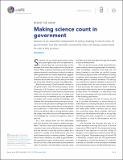Files in this item
Making science count in government
Item metadata
| dc.contributor.author | Boyd, Ian | |
| dc.date.accessioned | 2013-12-10T21:31:02Z | |
| dc.date.available | 2013-12-10T21:31:02Z | |
| dc.date.issued | 2013-07-02 | |
| dc.identifier | 64955501 | |
| dc.identifier | b2a08ef1-5049-45b0-ae5f-26fa962b8f99 | |
| dc.identifier | 84879928240 | |
| dc.identifier.citation | Boyd , I 2013 , ' Making science count in government ' , eLife , vol. 2 , e01061 . https://doi.org/10.7554/eLife.01061 | en |
| dc.identifier.issn | 2050-084X | |
| dc.identifier.uri | https://hdl.handle.net/10023/4283 | |
| dc.description.abstract | Science is an essential component of policy-making in most areas of government, but the scientific community does not always understand its role in this process. | |
| dc.format.extent | 1048576 | |
| dc.language.iso | eng | |
| dc.relation.ispartof | eLife | en |
| dc.subject | Q Science (General) | en |
| dc.subject | JN101 Great Britain | en |
| dc.subject.lcc | Q1 | en |
| dc.subject.lcc | JN101 | en |
| dc.title | Making science count in government | en |
| dc.type | Journal article | en |
| dc.contributor.institution | University of St Andrews. School of Biology | en |
| dc.contributor.institution | University of St Andrews. Marine Alliance for Science & Technology Scotland | en |
| dc.contributor.institution | University of St Andrews. Scottish Oceans Institute | en |
| dc.contributor.institution | University of St Andrews. Institute of Behavioural and Neural Sciences | en |
| dc.contributor.institution | University of St Andrews. Sea Mammal Research Unit | en |
| dc.identifier.doi | 10.7554/eLife.01061 | |
| dc.description.status | Peer reviewed | en |
This item appears in the following Collection(s)
Items in the St Andrews Research Repository are protected by copyright, with all rights reserved, unless otherwise indicated.

